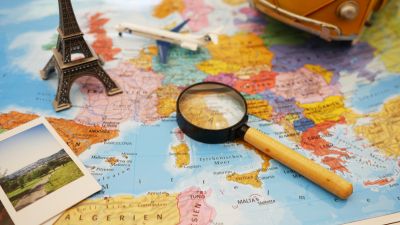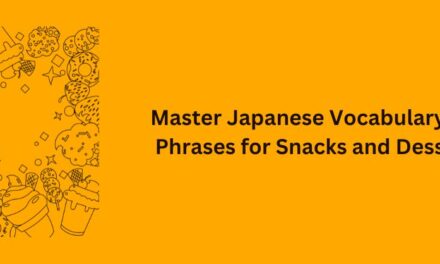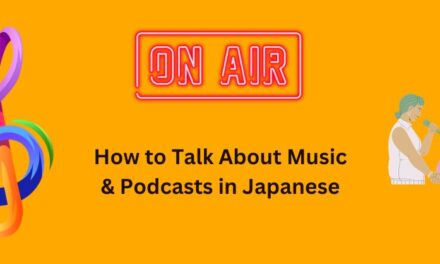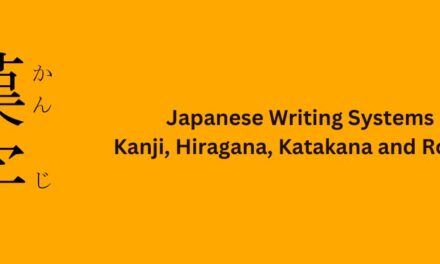Japanese Vocabulary for Holidays, Vacations and Weekends
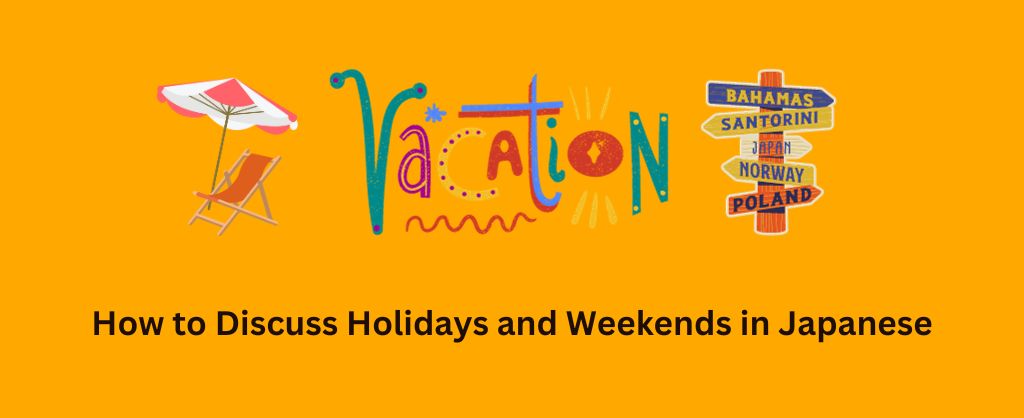
Register For the Online Japanese Event
Whether you’re planning a weekend getaway or a two-week holiday, knowing how to talk about time off and relaxing in Japanese is essential.
In this guide, we’ll cover key vocabulary, phrases, and cultural tips to help you discuss weekends, days off, relaxing activities, vacations and holidays in Japanese.
Topics covered in this article:
- Weekends and Days Off
- Talking About Relaxing Activities
- Vacations and Holidays
- Cultural Tips for Holidays
- Phrases to Use During a Japanese Conversation
Discussing Weekends and Days Off
In Japanese, the weekend is called 週末 (shūmatsu). The days of the weekend are:
- Saturday – 土曜日 (doyōbi)
- Sunday – 日曜日 (nichiyōbi)
Some key phrases for discussing weekends and days off:
- “What are your plans this weekend?” – この週末は何かすることありますか。(Kono shūmatsu wa nani ka suru koto arimasu ka.)
- “I’m planning to relax at home this weekend.” – この週末は家でゆっくりするつもりです。(Kono shūmatsu wa uchi de yukkuri suru tsumori desu.)
- “Do you have any days off this week?” – 今週、休みの日ありますか。(Konshū, yasumi no hi arimasu ka.)
- “I have Monday off this week.” – 今週の月曜日は休みです。(Konshū no getsuyōbi wa yasumi desu.)
- “Let’s go on a trip this three-day weekend.” – この連休に旅行に行きましょう。(Kono renkyū ni ryokō ni ikimashō.)
Talking About Relaxing Activities
Some verbs for relaxing activities in Japanese:
- To relax – くつろぐ (kutsurogu)
- To take it easy – のんびりする (nonbiri suru)
- To chill out – リラックスする (rirakkusu suru)
- To unwind – リフレッシュする (furesshu suru)
Here are some examples:
- “I’m going to relax and watch TV this weekend.” – この週末はテレビを見ながらくつろぎます。(Kono shūmatsu wa terebi o minagara kutsurogimasu.)
- “Let’s take it easy and sleep in tomorrow morning.” – 明日の朝はのんびりして寝坊しましょう。(Ashita no asa wa nonbiri shite nebō shimashō.)
- “We should chill out and listen to music after work today.” – 今日の仕事が終わったら、音楽を聴きながらリラックスしましょう。(Kyō no shigoto ga owattara, ongaku o kikinagara rirakkusu shimashō.)
Discussing Vacations and Holidays
Some key terms:
- Vacation – 休暇 (kyūka)
- Public holiday – 祝日 (shukujitsu)
- Golden Week – ゴールデンウィーク (gōruden wīku) – a series of Japanese holidays in late April/early May
- Summer vacation – 夏休み (natsuyasumi)
Useful phrases:
- “When is your next vacation?” – 次の休暇はいつですか。(Tsugi no kyūka wa itsu desu ka.)
- “I’m going on a one-week vacation to Okinawa.” – 沖縄に1週間の休暇で行きます。(Okinawa ni isshūkan no kyūka de ikimasu.)
- “Is January 1st a public holiday here?” – 1月1日はここでは祝日ですか。(Ichigatsu tsuitachi wa koko de wa shukujitsu desu ka.)
- “Many Japanese people travel during Golden Week.” – ゴールデンウィークには多くの日本人が旅行に行きます。(Gōruden wīku ni wa ōku no nihonjin ga ryokō ni ikimasu.)
- “When does summer vacation start?” – 夏休みはいつからですか。(Natsuyasumi wa itsu kara desu ka.)
Common Vacation and Holiday Activities
Here are some typical vacation and holiday activities in Japanese:
- To go sightseeing – 観光する (kankō suru)
- To go on a trip – 旅行に行く (ryokō ni iku)
- To travel overseas – 海外旅行に行く (kaigai ryokō ni iku)
- To return home (for the holidays) – 実家に帰省する (jikka ni kisei suru)
- To relax at a hot spring – 温泉でくつろぐ (onsen de kutsurogu)
Some examples:
- “We’re going sightseeing in Kyoto during spring break.” – 春休みに京都で観光します。(Haruyasumi ni Kyōto de kankō shimasu.)
- “I always go on a trip with my friends over summer vacation.” – 夏休みにはいつも友達と旅行に行きます。(Natsuyasumi ni wa itsumo tomodachi to ryokō ni ikimasu.)
- “My family traveled overseas during Golden Week.” – ゴールデンウィークに家族で海外旅行に行きました。(Gōruden wīku ni kazoku de kaigai ryokō ni ikimashita.)
- “I’m returning home for the New Year’s holidays.” – 年末年始に実家に帰省します。(Nenmatsu nenshi ni jikka ni kisei shimasu.)
- “We’re going to relax at a hot spring over the long weekend.” – この連休は温泉でくつろぎます。(Kono renkyū wa onsen de kutsurogimasu.)
Cultural Tips for Holidays
Here are some useful cultural tips for enjoying holidays and vacation time in Japan:
- Obon – During this Buddhist holiday in mid-August, many Japanese people return home to spend time with family. Public transport is very crowded.
- Oshogatsu – The most important holiday in Japan is New Year’s (Oshogatsu). Many businesses shut down and people travel to be with family.
- Golden Week – Many Japanese have multiple consecutive holidays during Golden Week. Flights and hotels get booked up very quickly.
- Bonenkai – At the end of each year, Japanese companies and groups hold “forget the year” parties (bonenkai) to unwind.
- High season – The peak domestic travel times are during school holidays like Golden Week, Obon summer break, and New Year’s. Prices increase and crowds gather.
- Train reservations – If traveling by train during high seasons, book your tickets well in advance to get reserved seats.
- Gift giving – It’s polite to bring a small gift (omiyage) when visiting someone’s home during the holidays. Regional food specialties are common omiyage.
Phrases to Use During a Japanese Conversation
週末何をしましたか?- Shuumatsu nani o shimashitaka? – What did you do during the weekend?
普段どうやってリラックスしますか?- Fudan douyatte rirakkusu shimasuka? – How do you usually relax?
普段いつ休みを撮りますか?- Fudan itsu yasumi wo torimasu ka? – During what time do you usually take days off?
一年間に休みは何日ぐらいありますか?- Ichinen ni yasumi wa nannichi gurai arimasuka? – How many days of holidays/days off do you have per year?
休みはどうやって過ごしますか?- Yasumi wa douyatte sugoshimasuka? – How do you usually spend your days off?
休みには旅行に行ったりしますか?- Yasumi ni wa ryokou ni ittari shimasuka? – Do you like to travel during your days off?
普段瞑想をしますか?- Fudan meisou o shimasuka? – Do you usually meditate?
スパに行くのは好きですか?- Supa ni iku no wa suki desuka? – Do you like to go to the spa?
___さんの国には温泉がありますか?- ______san no kuni ni wa onsen ga arimasuka? – Do you have onsen in your country?
どんな運動をするとリラックスできますか?- Donna undou o suruto rirakkusu dekimasuka? – What kinds of exercises can make you feel relaxed? (do you like to stretch, do yoga, go for walks? etc…)
____さんの趣味はなんですか?- _______ san no shumi wa nandesuka? – What is your hobby?
リラックスしたい時は一人でいる方が好きですか、それとも他の人と一緒にいる方が好きですか?- Rirakkusu shitai toki wa hitori de iru hou ga suki desuka, soretomo hoka no hito to issho ni iru hou ga suki desuka? – When you want to relax, do you like to spend time by yourself or with others?
どんな時ストレスがたまりますか?- Donna toki sutoresu ga tamari masuka? – When do you feel stressed?
どうやって疲れを取りますか?- Douyatte tsukare o torimasuka? – How do you get rid of tiredness?
はりやマッサージをしたことがありますか?- Hari ya massaaji o shita koto ga arimasuka? – Have you ever tried acupuncture or massage?
仕事は疲れますか?- Shigoto wa tsukaremasuka? – Does your work make you feel tired?
普段何時間寝ますか?- Fudan nanjikan nemasuka? – How many hours of sleep do you usually get?
普段何時ごろ仕事が終わりますか?- Fudan nanji goro shigoto ga owarimasuka? – Around what time does your work usually end?
Some useful tips for people traveling to Japan
Conclusion
Whether you’re chatting with friends, making travel plans or preparing for the holidays, this vocabulary and these phrases will help you discuss weekends, time off, relaxing vacations and holidays in Japanese.
Pay attention to cultural nuances, secure transport early if traveling, and brush up on essential seasonal greetings. With the key terms and tips covered here, you’ll be prepared to fully enjoy Japan’s many entertaining and relaxing holiday opportunities.



